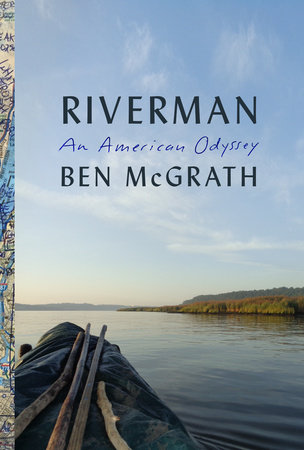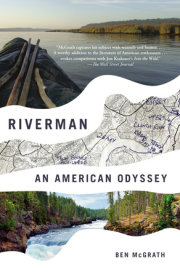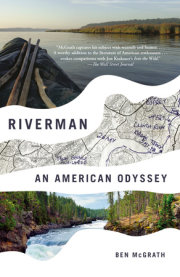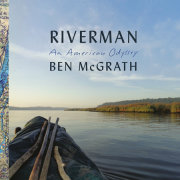1
Stone-Age Mentality
The most wonderful day in the very full, topsy-turvy life of Richard Perry Conant occurred in his forty-ninth year, in the summer of 1999. An auspicious start: he awoke without feeling ill. He was camped in a grove on the east bank of the Yellowstone River, whose water he had drunk, untreated, in great quantities the night before. Was it Monday? He wasn’t quite sure. Happily, he was losing track of time. A little more than a week had passed since he’d quit his job, as a janitor at the VA hospital in Boise, declaring himself fed up with the Clinton impeachment indulgence and maybe modernity itself. Before leaving, he’d stashed some frozen fish in the attic of the house he’d been renting, a stink bomb on delayed fuse. Then he’d driven to Yellowstone National Park, where he spied elk, goats, buffalo, and—on the Blacktail Plateau, amid lush meadows—a black bear. Finally, he’d gone to Walmart and bought a canoe, which he launched near the border of Montana and Wyoming. Destination: Gulf of Mexico.
Conant was now downstream of Yankee Jim Canyon, a narrow cleaving of the Absaroka and Gallatin ranges that chokes the river into an angry froth. He had capsized a couple of days earlier while struggling with a rapid known as Boateater, and been fortunate to lose only a machete and a hat in the process. The water was frigid, and he’d briefly reconsidered his options, among them adding outriggers for stability. But he no longer had access to a car, with which to resupply. As he stood on a bridge that morning, gazing nervously ahead, a truck driver stopped and asked, only half joking, if someone had drowned. Not so funny. Conant ate a quick breakfast (hot yams, more river water), and set about rearranging his gear, which included Pepto Bismol and a marble composition book in which he’d jotted a few reminders: “REMEDY FOR BUGS. KEEP SWATTING. How to get through rapids—hold on tight. CLOSE EYES.” Forget the outriggers. He was under way, a lone canoeist amid scattered dories in a seven-knot current, at around 10 a.m.
The canyon walls receded and he shot out into the valley, flanked in the near distance by ten-thousand-foot peaks. Cottonwoods lining the banks yielded summer snow to the flukey breeze. On the water, swirling eddies materialized and vanished inexplicably, while rainbow trout breached in the periphery of his vision. Paradise Valley: a name well deserved. Conant had traveled much of the world, and set foot in all forty-eight contiguous states, and he deemed this the most picturesque river valley he had experienced up close.
Afternoon brought heavy weather and a slalom course, as the straightaways shortened and he coped ably with shoals and rapids. Somehow, in the course of sliding forty-five miles, he scraped just two rocks. And then, half an hour before sunset, he arrived, brimming with adrenaline, in Livingston, a town that seemed composed of equal parts galleries and saloons. Yuppies and cowboys. A man like Conant—an old art major with Falstaffian appetites—could imagine getting used to such a place.
But he was on a mission, of a sort. He had notions of spending Christmas in Mississippi (Natchez or Vicksburg), and of ringing in the millennium in New Orleans. He thought it best not to “tarry,” as he liked to say, thinking of his deceased father, an army colonel with a performative sense of rectitude. He won a little money gambling at a hotel casino on the south end of town, and spent the extra cash on Bernard DeVoto’s abridged Journals of Lewis and Clark, good companionship for a transcontinental river trip.
In a park near some ballfields, while Conant repacked his boat, a young brunette was walking her dog. They got to talking. Her name was Tracy. She seemed intrigued by his plans, maybe even impressed by his derring-do. Conant, who had been dressing more or less exclusively in bib overalls since Woodstock, had grown familiar in recent years with being regarded as a misfit rather than a rugged charmer: a janitor, after all, in spite of a graduate education. A gifted natural athlete, he now carried well over two hundred pounds on his six-foot-one frame. No matter his evocative blue eyes and wispy blond hair. He was highly perceptive, and sometimes sensitive to a fault. Yet here was someone, perhaps, who saw him the way he was still determined to see himself: intelligent, adventurous, charismatic, ambitious.
Tracy asked what he planned to do when he was finished with the journey. It was a natural question, and a heady one. What should a middle-aged man who has quit his job and stink-bombed his home hope for, after conquering more than three thousand miles on one of the earth’s longest unbroken chains of river—Yellowstone to Missouri to Mississippi? He liked university towns and big skies. He liked hospitals: before becoming a janitor, he’d worked as a scrub, prepping for surgery. He said that he was thinking of settling nearby, in Bozeman, with an eye toward studying bacteriology. A little late to resume a medical career, but the vigorous long paddle into town had left him feeling youthful and optimistic. Reflecting on the exchange as he continued downriver, he recalled a bashful glimmer in the woman’s eyes at the prospect of his returning. “I hope I see Tracy again,” he wrote in his composition book.
•••
After a week afloat, he found himself occasionally unsteady on his feet, the ground seeming to rise and fall beneath him, as though carried by waves. He learned to avoid the gunpowder-gray sand, which was deceptively yielding, and capable of sucking the shoes off his ankles, in favor of gravel bars, the rockier the better. The river shed two thousand feet in elevation in a couple hundred miles, and then, having left the mountains behind, began to slow. The temperature climbed above a hundred. The lush valley turned into prairie badlands, with red streaks and coal in the ochre bluffs. He saw paw prints larger than his own hands, and a bobcat the height of a German shepherd.
The vertigo subsided, but bugs were a persistent problem: black flies so adept at the hit-and-run that Conant found himself unable to distinguish between real bites and phantom bites—a kind of preemptive paranoia; gnats, which he inhaled by the cloudful; and mosquitos, never more annoying than when they dive-bombed the moisture of his eyeballs and got trapped in his defensive lids. While studying the ingredients lists in many of the itch-relief products available in drugstores, he noticed that ammonia kept recurring. So he scoured the cleaning supplies, and bought himself a pint of Parsons’ Household, for a buck-fifty. After a localized experiment produced no skin rashes, he began buying the stuff in bulk and applying it as a comprehensive daily salve. On his hands and feet, and even his face, meanwhile, he used Bag Balm, a lanolin-based livestock disinfectant, to seal cracks and stave off chilblains. When he ran out of shoe grease for his boots, he tried the Bag Balm on them, as well, and found that it repelled moisture just as effectively, and for half the price.
The frames of his glasses were pitted with metal that began to rust after the capsizing at Yankee Jim Canyon, but he was regaining his night vision, a source of pride from his navy days as a ship’s navigator. Approaching Sidney, near the North Dakota border, he saw five shooting stars, and later made his way back to the canoe from town by starlight, through fields of wheat and corn. The air was so clear, and free of dust, that he realized he had gone a couple of weeks without the urge to pick his nose. For reading and writing at camp, he built what he thought of as a Chinese lantern, standing a white plastic dishwashing basin on its side and placing a row of citronella gel candles behind it, shielded from wind. By the end of August, he had regressed to a “stone-age mentality,” as he put it, fashioning acoustic chambers (for his radio) and cooking stoves out of sedimentary rocks, and burning the coal for fuel. He had also acquired a passenger: a mouse, which was nibbling holes in his dry bags in search of food.
Conant’s merger with the Missouri was uneventful, but the addition of the Little Muddy River, outside Williston, produced a labyrinth of delta hedgerows and willow islands in which he got lost. While seeking a place to camp, amid electrical storms, he was chased by a steer. He found a cave with bones littered around the entrance and built himself a sleeping coffin out of driftwood, “a Lincoln Log kind of a deal.”
After the labyrinth, the Missouri was less a river than a chain of elongated lakes, with scalloped shorelines, backed up behind massive dams. In the mornings, he was sometimes greeted by thousands of large-scaled carp at the surface, so plentiful that he had to be careful not to bat them with his paddle. For long stretches he could detect no current, but there were genuine sea swells and surfable breakers. He felt as if he were on the Atlantic. When paddling into headwinds, he learned to time his strokes to coincide with the arrival of cresting waves by his side, thereby shortening his reach by several inches. With following seas, he tried to absorb wave thrusts on his starboard aft quarter and then grab the crests with his paddle as they passed by.
October brought screeching ravens, the smell of fresh wild mint, and, one morning, a thick fog that yielded to slanting sleet that blasted his corneas. A couple of days later, observing great cumulus formations drifting west in a continuous stream over the Lower Brule Sioux Reservation, in South Dakota, he suddenly realized that the eastern half of the sky was entirely blue. Then he saw wisps of moisture rising from the middle of the river: a cloud fountain.
He enjoyed vivid dreams: porpoises jumping the turnstiles of a flooded subway station. He learned to stow primo driftwood in his cooler, so that he’d have dry kindling even when it rained. He discovered a nice thing about traveling south at a dammed river’s pace through the fall: the elongation of peak foliage, soon to be stretching into a third month.
The trip’s rough midpoint, both by distance and thematically, was Sioux City, Iowa, where the shipping channel begins—or ends, if you’re a tugboat captain traveling upstream from New Orleans. Conant celebrated the conclusion of the wilder half of his journey by checking his blood pressure at a supermarket kiosk. It had plunged from 200/100 to 120/77. No better medicine. A few days later, near Decatur, Nebraska, he was awakened for the first time by the sound of a tug pushing a barge. “I scrutinized the resulting wave action,” he wrote. “It did not swamp my boat as I feared it might. These waves were navigable. Safety will require constant vigilance.” Ahead lay Omaha, Kansas City, St. Louis, Memphis: a buoyant highway.
Copyright © 2022 by Ben McGrath. All rights reserved. No part of this excerpt may be reproduced or reprinted without permission in writing from the publisher.








